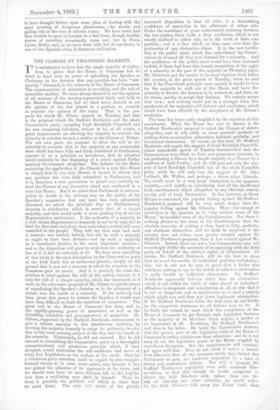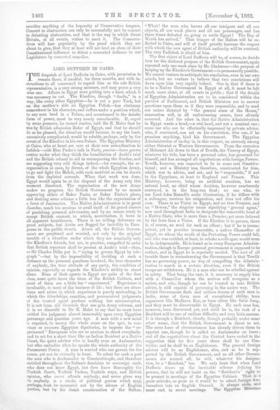THE CLOSURE BY TWO-THIRDS MAJORITY.
IT is satisfactory to have had the ample majority of eighty- four, to prove that the House of Commons has no mind to hand over its power of upholding the Speaker or Chairman in his decision that any question has been "ade- quately " discussed, to the minority of the House of Commons. The representation of minorities is one thing, and the rule of minorities another. We have always desired to see the opinion of all sections of the country represented fairly and fully in the House of Commons, but we have never desired to see the opinion of the few placed in a position to override in practice the opinion of the many. That is the pro- posal for which Mr. Gibson argued on Tuesday, and that is the proposal which Sir Stafford Northcote and the whole Conservative party, excepting Lord Randolph Churchill and his two remaining followers, declare to be, at all events, a great improvement on allowing the majority to override the minority in relation to such a matter as the Closure of Debate, For our own parts, the proposal to allow the will of the minority to override that of the majority on any conceivable issue which has been fully and fairly submitted to Parliament, appears to us a principle so monstrous, that its adoption would probably be the beginning of a recoil against Parlia- mentary Government altogether. The defence for the Rules restricting the application of the Closure in a very thin House is simply that in very thin Houses it cannot be shown that any question has been fully submitted to Parliament, and it is, therefore, a wise precaution to guard very carefully in- deed the Closure of any discussion raised and continued in a very thin House. But if we admit that Parliament is not com- petent to decide in the ordinary way on the justice of the Speaker's impression that any issue has been adequately discussed, we admit the principle that no Parliamentary decision is satisfactory which is merely that of a simple majority, and that would make a mere quaking bog of all our Representative institutions. If the authority of a majority in a well chosen Representative Assembly is not to be regarded as final for that time and place, then even what is settled will seem unsettled to the people. They will say that such and such a measure was carried, indeed, but not by such a majority as ought to have been decisive—not by such a majority as is considered decisive in the most important matters— and so the disposition will grow to treat even the authority of law as if it had PO authority at all. We have seen something of this lately in the open description by the Conservative party of the Irish Land Act as authorised plunder, simply on the ground that it was not a measure to which the minority in the Commons gave its assent. And it is precisely the same dis- position to rebel against the will of the nation, because it is only the will of a simple majority, which has blossomed, as it were, in the subversive proposal of Mr. Gibson to put the power of repudiating the Speaker's decision as to the adequacy of a debate into the hands of a minority. If the minority had been given this power to censure the Speaker, it would soon have been difficult to limit the ambition of minorities. The great evil in the House of Commons has been, and is, the rapidly-growing power of minorities, as well as the dwindling resolution and peremptoriness of majorities. Mr. Gibson, supported by Sir Stafford Northcote, endeavoured to give a solemn sanction to this Mischievous tendency, by inviting the majority formally to resign its authority, in rela- tion to the most pressing subject of the day, into the hands of the minority. Fortunately, he did not succeed. But he did succeed in committing the Conservative party to a thoroughly unconstitutional and pernicious principle which, if once accepted, would undermine the self-confidence and nerve of every free Legislature on the surface of the earth. Once let a victorious party accustom itself to regard its own straight- forward victory as in some sense unfair, only because it has not gained the adhesion of its opponents to its views, and we should soon have no more firmness left in the Legisla- ture than a vacillating man finds in himself. That, in- deed, is precisely the political evil which in these daye we most dread. The only
bad result of the greatly
increased disposition to hear all sides, is a diminishing confidence of conviction in the adherents of either side. Under the semblance of great controversial acrimony between the two parties' there lurks a deep vacillation, which is not wholly confined to either side, as to the truth of their own position ; and it is that which we fear, more even than the pertinacity of any obstructive clique. It is the new vacilla- tion of the public mind which has emboldened the Conser- vatives to demand all they now demand for a minority. And. the vacillation of the publics mind would have been increased tenfold, if there had been this formal recognition of the rights of a minority on the part of the majority on Thursday night. Mr. Gladstone put the matter in its most vigorous form before the country, in the great speech of Tuesday, when he said that if the Two-thirds principle were carried, it would be best for the majority to walk out of the House, and leave the minority to discuss the decision to be arrived at, and thee, on its return, meekly to accept that decision. We entirely accept that view ; and nothing could put in a stronger form that apotheosis of the majority's self-distrust and vacillation, which would have been effected by the acceptance of Mr. Gibson's' resolution.
The issue has been vastly simplified by the rejection of this amendment. What the House has now to discuss is Sir Stafford Northcote's proposal to reject the Closure of debate altogether, and to rely solely on more personal methods of putting down meaningless reiteration, habitual prolixity, and intentional obstruction. Of course, on this issue Sir Stafford Northcote will regain the support of Lord Randolph Churchill, whose remarkable speech of Tuesday demonstrated that the Conservatives were blind to their own permanent interests, in not preferring a Closure by a simple majority to a Closure by a coalition of both Parties ; and he will gain not only the sup- port of Lord Randolph Churchill, but of the whole Parnellito party, while he will only lose the support of Sir Sohn, Lubbock, Mr. Walter, and perhaps a dozen other Liberale, The result must be a very great diminution in the apparent majority,--and rightly BO, considering that all the disaffected Irish constituencies object altogether to any effectual remedy for the evil of Irish Obstruction. So far, however, as Great Britain is concerned, the popular feeling against Sir Stafford Northcote's proposal will be very much deeper than the popular feeling against Mr. Gibson's. There was enough of puzzledoin in the question as to "the evident sense of the House," to bewilder some of the Constituencies. But there is nothing plainer to the sense of the Constituencies than the absolute necessity of putting a clear limit to folly, prolixity, and obstinate obstruction, and we shall be surprised if the country does not evince , even greater warmth against Sir Stafford Northeote's proposal, than it leis evinced against Mr. Gibson's. Indeed, there are not a few Conservatives who will exceedingly dislike the necessity of co-operating with the Irish party on behalf of the abstract rights of Obstructive& Of course, Sir Stafford Northcote will do his best to show that he is not favourable to individual prolixity and obstauc- tion, but it will not be easy to prove that a leader who will have nothing to say to the defeat of collective obstruction
is really hostile to collective obstruction, Sir Stafford Northcote apparently believes either that no obstruction which is not within the teach of rules aimed at individual offenders, is dangerous and mischievous at all, or else that it is not so dangerous and so mischievous as to need a remedy which might now and then put down legitimate obstruction.. If Sir Stafford Notthcote holds the first view, he can hardly be the competent statesman we all believe him to he. If he holds the second, he must think the competence of the House of Commons to get through such legislative business as the majority of its Members think urgent, a matter of
no importance at all. Doubtless, Sir Stafford Northcote's real view is the latter. He holds the Conservative doctrine that the greater part of the legislative work of the House of Commons is rather mischievous than otherwise ; and he is net sorry to see the legislative power of the House crippled by superfluous discussion. But the constituencies will certainly not agree with him. They do not think it rather a benefit than otherwise that all the measures which they elected this Parliament to pass, are rendered impossible by a knot of dreary and contentious talkers. Nor will it increase Sir Stafford Northeote's popularity even with moderate Con- servatives, to find that though he would coMpOund to silence the Irish Members only, rather than run the risk of silencing any other minority, he would rather Jot the Isiah Members talk away the Union itself, than
sacrifice anything of the loquacity of Conservative tongues. Concert in obstruction can only be successfully met by concert in defeating obstruction, and that is the way in which Great
Britain, at all events, wishes to meet it. The Conserva- tives will lose popularity by the proof which they are about to give, that they at least will not lend an atom of their Constitutional influence to defeat a concerted defiance to our Legislature by concerted remedies.



































 Previous page
Previous page